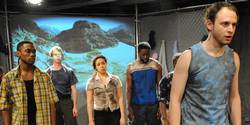SEARCH
REVIEWS
REVIEW ARCHIVES
ADVERTISING AT CURTAINUP
FEATURES
NEWS
Etcetera
LISTINGS
Broadway
Off-Broadway
etcetera- NEWS
BOOKS and CDs
OTHER PLACES
See links at top of our Main Page
QUOTES
TKTS
PLAYWRIGHTS' ALBUMS
LETTERS TO EDITOR
FILM & TV
LINKS
MISCELLANEOUS
Free Updates
Masthead
A CurtainUp DC Review
|
" Israel ... the smallest country with the biggest problems," observes." — an Israeli who wonders why so many refugees from Sudan and Eritrea chose to flee there.
|

The company (Photo by Stan Barouh).
|
More a docu-drama than a play, The Promised Land was initially developed from original testimony and performed by the youth ensemble of Israel's national theater, Habimah. Director Michael Bloom has adapted the series of monologues for an American cast.
The arrival in the last decade of 50,000 to 60,000 (depending on your source) Africans to Israel (population 7 million), put enormous strains on Israel's resources, and principles such as the Judaic belief in tolerance of outsiders. Unlike the arrival in the 1980's and 1990's of the Falashas (Jews from Ethiopia who, it is believed by some, to be descendents of the lost tribe), not everyone was willing to welcome the Eritreans and Sudanese. "What do you want from me?" says one Israeli character. Under Israeli law the refugees who sought asylum could not be deported back to Egypt or their homelands nor could they get work permits.
Each monologue in The Promised Land tells of a refugee's flight, the price paid to human smugglers and the journey to what they think will be the promised land. These true stories include those of Israelis like the mayor of Eilat whose city was overwhelmed by the number of asylum seekers who came to his city and the young Israeli soldiers tasked with making sure that they are being told the truth and that those they question are not terrorists.
Andrew Cissna's minimalist set and lighting consists of a mesh wire fence, a desk, a chair, and a few props —just enough to send a chill down one's spine. The actors, each of whom represents several characters, range from ok to very moving. The authoritarian voice of Felipe Cabezas and Gary Kayi Fletcher's descent from optimism to sad acceptance of his fate are noteworthy but the performance that stands out is that of the super talented Kathryn Tkel as a young girl.
Director Michael Bloom has added a nice touch to the original production. He has each of his actors speak of their personal backgrounds, how members of their families a few generations back were refugees and how they fared in the U.S. Aaron Bliden tells of his grandfather failing his medical school entrance exams four times but is now a respected doctor in Havre de Grace, Maryland. Brayden Simpson explains with great thoughtfulness the Mediterranean origin of his rare, inherited blood disease.
There's plenty to think about in The Promised Land. It speaks specifically to the challenges faced by Israel but, given the current tragic fate of refugees from Syria, the subject could not be more topical. It deserves greater exposure and a longer life than its all-too-brief run in Washington, DC.
|
The Promised Land by Sachar Pinkas and Shay Pitovsky Directed by Michael Bloom Set and lighting by Andrew R. Cissna Cast: Audrey Bertaux (Officer, Emmanuel's Mother, Attendant, and ensemble); Aaron Bliden (Officer, Soldier, Menashe Flurentin, and ensemble); Felipe Cabezas (Mayor of Eilat, Officer, Soldier, and ensemble); Gary-Kayl Fletcher (Emmanuel's Father, Ali Halif Atiana Adam, and ensemble); Awa Sal Secka (Nadak's mother and ensemble); Brayden Simpson (Emmanuel and ensemble); Kathryn Tkel (Nadak and ensemble). Run time: 70 minutes, no intermission. Mosaic Theater Company (www.mosaictheater.org) in residence at Woolly Mammoth, 641 D Street, NW, Washington, DC; February 16 to 28, 2016; Tickets: $20 to $50. 202-399-7993, ext. 2; mosaictheater.org. Review by Susan Davidson based on February 18, 2016 performance. |
|
REVIEW FEEDBACK Highlight one of the responses below and click "copy" or"CTRL+C"
Curtainup at Facebook . . . Curtainup at Twitter Subscribe to our FREE email updates: E-mail: esommer@curtainup.comesommer@curtainup.com put SUBSCRIBE CURTAINUP EMAIL UPDATE in the subject line and your full name and email address in the body of the message |

|


 Book of Mormon -CD
Book of Mormon -CD